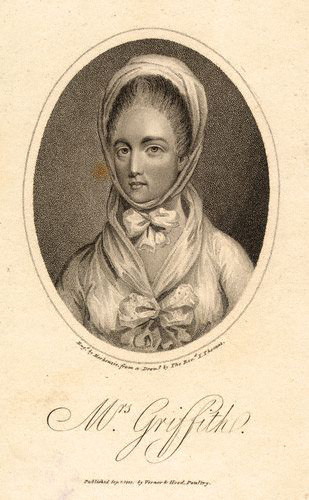Dr Johnson’s Reading Circle came back to their screens to see how The Times by Elizabeth Griffiths plays out. At the end of Act 4 we were left with marital confusion, imminent financial ruin, a big party with extravagant costumes and an obviously significant pair of earrings that have passed through many hands. I predicted a dramatic ending.
Act 5 starts with the servant Forward setting up for a night of gaming at the Woodleys’. As usual, he’s out to grab what he can, earmarking the expensive candles, the nice cards (not the bent ones covered in snuff) and even the specialised card tables for his own use. The Woodleys walk in to finalise the details. They are sweet together, holding hands and giving each other little compliments. After confusion over who Sir William is trying to marry Louisa to, Mr Woodley finally admits to his wife that they are seriously short of funds. He’s expecting Lady Mary to react badly, the audience is expecting her to react badly but instead she says that she’d happily live in Dorset(shire) without a full complement of servants as long as she can still be with Mr Woodley. He’s delighted that she’s taken the news so well, his fear of telling her has been his main conflict in the play and he leaves happily. Then she makes the longest speech, where she even quotes Hamlet, and declares that she’s happy to give up all the glitz for her true love but she will miss society and the friendship of people like Mrs Bromley.
Then follow a couple of short scenes, one where Woodley and Colonel Mountfort are annoyed that they can’t get in contact with Louisa, and one where Louisa is talking with Sir William, which is why she can’t contact the other two. As usual Sir William is not listening to anyone else and is sympathetically trying to tell her that her marriage to Belford (who she doesn’t wish to marry) is off while she’s trying to tell him about the Woodleys’ decision to go to the country.
Then follows the main scene the play has been building towards, an evening of various card games at the Woodleys. The room has been set so that different games occur in different areas and the conversations of the whist, loo and quadrille players interject, overlay and interact with the conversations had by the main cast. It’s a pretty dynamic piece of staging and we imagined there was probably a lot of business happening that isn’t in the stage directions. Were we more knowledgeable of eighteenth century card games and the language that went with them, all the talk of pams, loos, monsters and beasts may have added to the meaning. As such, they added to the texture.
Early on in the scene, Lady Mary tells Mrs Bromley of her decision to move to their country house and invites her to visit but she is rebuffed and starts to look at Mrs Bromley differently. Then she sees that Mrs Bromley is wearing her earrings from the beginning of the play which she thought were being added to but were actually sold to Mr Bromley. When Mrs Bromley rudely gloats that they are hers now as she actually has the money to pay for them, Lady Mary is repelled. Then Mrs Bromley sits down to play loo and is immediately found cheating. She looks to Lady Mary for support but finding none, storms out. Then there’s a message that bailiffs have come, sent by Mr Bromley, and the room clears, everyone owing something to somebody.
Louisa wakes Sir William up to help, the bailiffs having been shooed away by Colonel Mountfort and his money. William blusters and bluffs, saying how the Woodleys deserve prison for their spendthrift ways but is clearly pleased that this hasn’t happened because of the good Colonel, who actually he rather likes now and has probably always liked, even if he argued with him in the previous act. They come together and Sir William, pleased by the Colonel, allows him to marry Louisa. Also pleased with Lady Mary’s decision to move to the country, he decides to settle the Woodleys’ debts and give them the house so they can come to London for the season. He talks over everyone’s attempts to thank him and the play is over.
It must be said, The Times ends on something of an anti-climax. While it was clear that Sir William had the power and means to solve everyone’s problems, it seemed there needed to be rather more happening to bring him round. Set up as pig-headed and blinkered, unable to hear anyone’s views but his own, he changes his mind considerably at the end of the play. Similarly, Lady Mary, who seemed to be completely immersed in commercialism suddenly decides that she loves her husband more than any of the fripperies she had been spending thousands of pounds on. While Mrs Bromley was exposed as a card cheat and hissed out of the room, Mr Bromley isn’t on stage in the last act and his comeuppance is a hasty line about being imprisoned for tampering with his bills. The beginning of the play teased a big masquerade, where Lady Mary would be dressed as a Sultan, dripping in jewels, this never happened. And while the earrings did play a role in Lady Mary’s opinion of Mrs Bromley, they didn’t have the huge Desdemona’s Handkerchief level significance that the play seemed to have been building to.
There were fun characters and good set-ups but it felt like the play hadn’t given them enough to do or escalated into an intractable ball of confusion to be sorted out at the end. Whereas other eighteenth-century comedies we have read together needed a flow-chart to understand, The Times felt a little rushed and easy. That said, it did have the dynamic card table scene, the joy of Sir William’s bluster, Lady Mary’s easy spending and the Bromley’s fun two-facedness. It was a fun play but just a little undercooked.



No comments:
Post a Comment